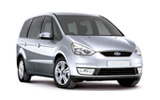I can always hear or read about car rental customers being ripped off with forced full – empty fuel policy unwanted insurance added to the rental agreement or unwanted upgrade.
![]() Miles Brignall from The Guardian wrote a Holiday Car Hire Guide which can help you understand car hire and save holiday makers a lot of money and stress. Be prepared with this tips and you won’t be repped off or “taken for a ride”.
Miles Brignall from The Guardian wrote a Holiday Car Hire Guide which can help you understand car hire and save holiday makers a lot of money and stress. Be prepared with this tips and you won’t be repped off or “taken for a ride”.
1. Buy the basic package only
The secret to saving money on car hire is to buy the basic package only. Car hire firms make all their profits by selling you the add-ons, which are usually absurdly expensive. In particular, ignore pressure to buy their collision damage waiver (CDW) or “super” CDW insurance, which will cover the “excess”, usually £500-£1,000, not covered by the basic insurance. Instead, arrange your own cover independently – see step three.
Use online agents such as holidayautos.co.uk, argushire.com, auto-europe.co.uk to check hire prices first, but also look on the sites of the major players, such as Hertz, Avis, Budget, Europcar and Sixt. They often have special offers making them just as cheap as the brokers, and booking direct has its benefits if there are problems later.
Keep to on-airport operators – not only are they more convenient, but “cheap” off-airport deals can be a false economy when the car turns out to be a dud. Hire deals organised by airlines such as Ryanair’s link with Hertz are rarely better value than using a broker or going to the hire firm direct.
2. Bring your own satnav and child car seats
We tested the cost of hiring a satnav for a week in Italy with Hertz and were asked for €97 (£78.50) for one week. In Spain, Europcar wanted £77.
This is a waste of money. You can buy a new satnav that covers both the UK and Europe for around £50-£60.
Child seats are more tricky. Hertz wanted £78.50 while Europcar asked for £74, and £60 for a booster seat. But if you are flying with a charter airline such as Monarch, it is free to take a child seat with you. Booster seats cost as little as £8 to buy in the UK, indicating just how overpriced the car hire deals are.
If you are flying on a low-cost airline such as Ryanair, check the additional baggage cost when booking. Ryanair charges £10 each way for a child car seat, so even with this extra cost it can still make sense to bring it along.
3. Save £100 by buying excess insurance
When you rent a car, the price generally includes insurance cover for a major crash, write-off, etc, but leaves you with the bill for the first £500 to £1,000. If there are any small scratches or scrapes, adding up to, say, £500 worth of damage, it means you have to pay it in full. So the car hire firms try to persuade you into buying super CDW insurance to cover this first £500-£1,000. But they charge as much as £150 for a week, compared to the £33 cost of buying it independently.
Insurance4carhire.com is an independent insurance company that will sell you an annual excess policy for Europe for £49, or £4.75 per day for shorter rentals.
Unlike the car hire firm’s own policies, its policies cover damage to windows, tyres, undercarriage and the roof, and the rest of the car up to £2,000 per single claim. If you damage the car, you pay the car hire firm the agreed excess and then reclaim.
Readers who have claimed say customer service and claims handling is quick and excellent.
icarhireinsurance.com is another firm in this area. Its annual European policy is £40 a year, but is not quite as comprehensive.
4. Ignore the sales patter at the collection desk
This is where you need to be strong. Don’t be persuaded to buy insurance you have already paid for (above). When you fill out the rental agreement, the local agent will try to sell you their super CDW that reduces the excess to zero. They will tell you that your insurance isn’t valid (it is) and they will try to sell you windscreen wheel, tyre, and undercarriage insurance (if you bought from the likes of Insurance4carhire, you will also have this).
Assuming you have a policy, don’t fall for it. We get lots of complaints about this, and the car hire firm is under no obligation to refund you because you bought two policies – nor is the agent you hired the car from. If you paid twice, it’s your mistake.
When you refuse the extra cover, the rental firm will “pre-authorise” a sum to cover the excess on your credit card – typically £600 or so in the local currency. This is normal and allows the firm to charge your card the excess if you do have a crash. They will also charge you for the fuel if appropriate.
You will need enough available credit on your card to handle both.
5. Check the fuel policy, the mileage and other extras
Before you hand over your credit card details, look up the company’s fuel policy. If you are driving a long way, does your rental limit the mileage in any way? If you are under 25, is there a surcharge?
A growing number of firms (for Spanish rentals in particular) now insist on a full-to-empty fuel policy on rentals of more than three or four days. You pay for a full tank of fuel and then bring it back empty, which is fine in theory, but if you aren’t using the car much you’ll end up paying for three-quarters of a tank of fuel you didn’t use.
Renters on the small Spanish islands report it being impossible to use a full tank of fuel. Even the big firms now adopt this policy. The only way round it in Spain for those on a week’s holiday is to go for a series of short rentals. Elsewhere, such as Italy, it is less prevalent, but starting to appear.”
Read 5 more car hire tips here >>
Car hire shouldn’t be so complicated but like low cost airlines car rental firms offer the basic packages for cheap daily rates and later down the line -usually at the rental desk- trying to sell/add costly extras what most of the holiday makers will buy just let them go or they feel there is no other choice







